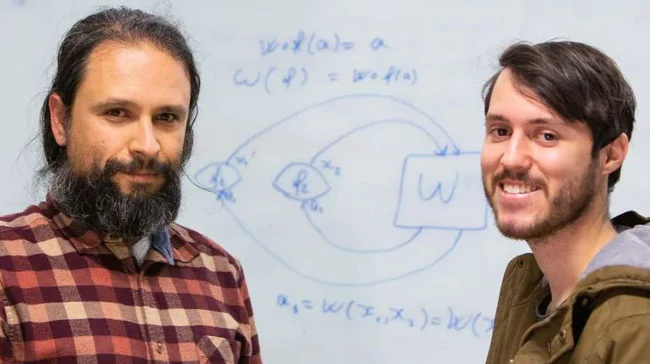
Germain Tobar is an Honours student in physics at the University of Queensland. This year, the Classical and Quantum Gravity journal has published a paper of his which describes the possibility of paradox-free time travel in our universe.
Germain says that the discovery is a shift from previous research which maintained that avoiding paradoxes meant there would be restrictions on free choice.
“Say you go back and kill your own grandfather, prevent your[self] from being born, then you could never go back in time and kill your own grandfather,” he said. But as far as he knows, this doesn’t happen.
Instead, he says that events can occur in ‘time loops’, which allow an object to interact with its past self, but while still sending its past self on a course that would take it into the time loop.
“Our work seems to suggest that events that are in these time loops — where events are in the future and past of themselves — can be self-correcting,” Germain said
“Say you wanted to go back in time and stop ‘patient zero’ and stop the coronavirus pandemic from ever getting out, if you stopped ‘patient zero’ from ever getting infected, that would cause a paradox, because you wouldn’t have the motivation to go back.
“So our work suggests self-corrections can occur, so for example you could go back in time, you could isolate patient zero, but in doing so, you might catch coronavirus and become patient zero,” he said.
As a result, he says that things like Back to the Future probably get time travel wrong, “because it seems to suggest that you can go back and change things and that completely rewrites history, and that’s just fundamentally incompatible with our ideas of time in our universe.”
But it’s still unclear exactly what mechanisms are behind the self-correction within the time loops, and whether they’re even possible in real life.
“Our work at the moment is a very abstract framework. It’s more of a framework to not rule out the possibility that time travel is possible,” Germain said.
“The next step in the research would be to show how these self-corrections can occur. We’ve just found a variety of logical processes in these processes where self-corrections do occur, and so the existence of them just doesn’t rule out that time travel is possible.”
“But that doesn’t mean that there’s not further restrictions that could prevent these self-corrections from occurring in real life,” he said.
He also says that any experiments that could demonstrate the possibility of time loops in our universe are unlikely to be feasible in the near future (although the concept of ‘near future’ is a bit relative when talking about time travel).
“These time loops are purely maths on a page at the moment. They’re predicted to occur out of Einstein’s theory of general relativity. All the predictions that have so far come out of Einstein’s theory have been proven right,” Germain said.
“For instance black holes just won the Nobel Prize a couple of days ago, and fifty years ago, people thought that black holes were just maths on a page, and couldn’t occur in real life.”
“So even though these time loops are just maths on a page at the moment, it might suggest they can and do occur in our universe, for example they’re predicted to occur in really extreme parts of our universe, like around rotating black holes.
“That raises the question of, if they do occur in our universe, how can things move through them without creating a paradox?” he said.
“Nothing in the immediate future [could prove this], because to create or observe these time loops, you would either need to go to a rotating black hole, or have negative mass and negative energy.”
But all the same, Germain says there are some ways we could approach the topic in related fields.
“[One experiment is] to do with quantum physics, and how you can get a lack of causality just out of quantum physics alone. So in that framework, you can do experiments that verify that event A causes event B and simultaneously event B causes event A, which is totally whack and counterintuitive, but our experiments do show this,”
“Of course it’s not time travel, but it’s related in that there’s a lack of causality.”
Germain said that getting published was in no small part thanks to his supervisor, Dr Fabio Costa.
“He set up the groundwork for those formulas, and that helped me to develop it further.”
“I thought it was just a purely mathematical technical result. I showed it to my supervisor, and he was like ‘let’s write a paper on it’. I didn’t think it would blow up like this.”
Germain says students who want to get their work published should “grab opportunities when they arise”.
“The way I got into this was a UQ Winter research scholarship, I saw a list of advertised projects, I saw this one on time travel, I thought that’s cool, I’m gonna apply for that,” Germain said.
“I easily could have just thought ‘nah, I’m too busy, I won’t apply for that’, and I wouldn’t be sitting here right now.
“So if you see opportunities, just apply for them,” he said.
Most science departments send out a list of available research projects for Summer or Winter research, they’re advertised on their department page, so you just look up Summer or Winter research UQ, and you can get a list of projects from the entire science faculty.
So what’s next for Germain?
“I’ve gotta get through honours first, I’m just coming to [the end of] my first semester, [and then] I’ll be halfway through,” he said.
“Then hopefully graduate June next year, then I don’t know. No plans after that, maybe a PhD.”
Views: 2181
